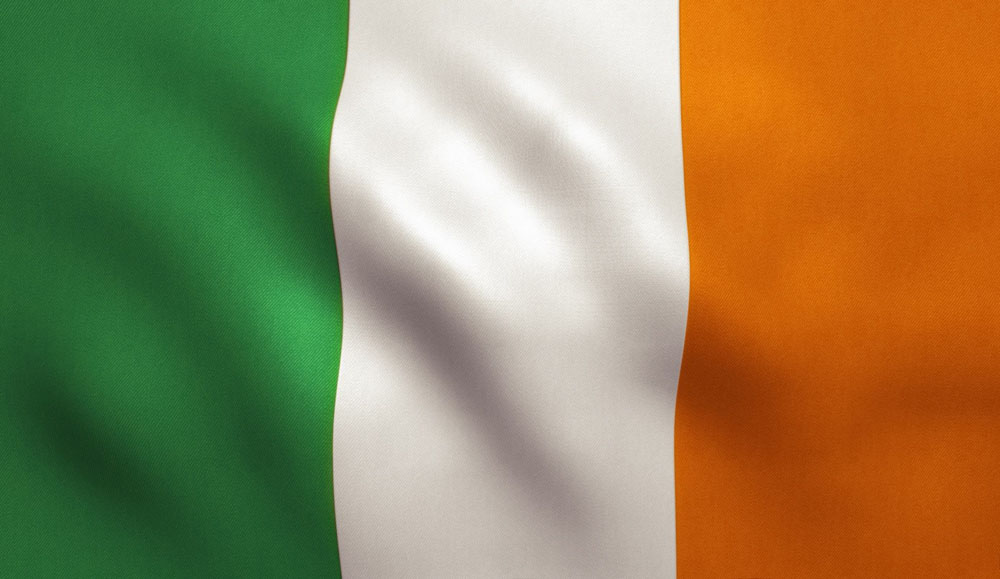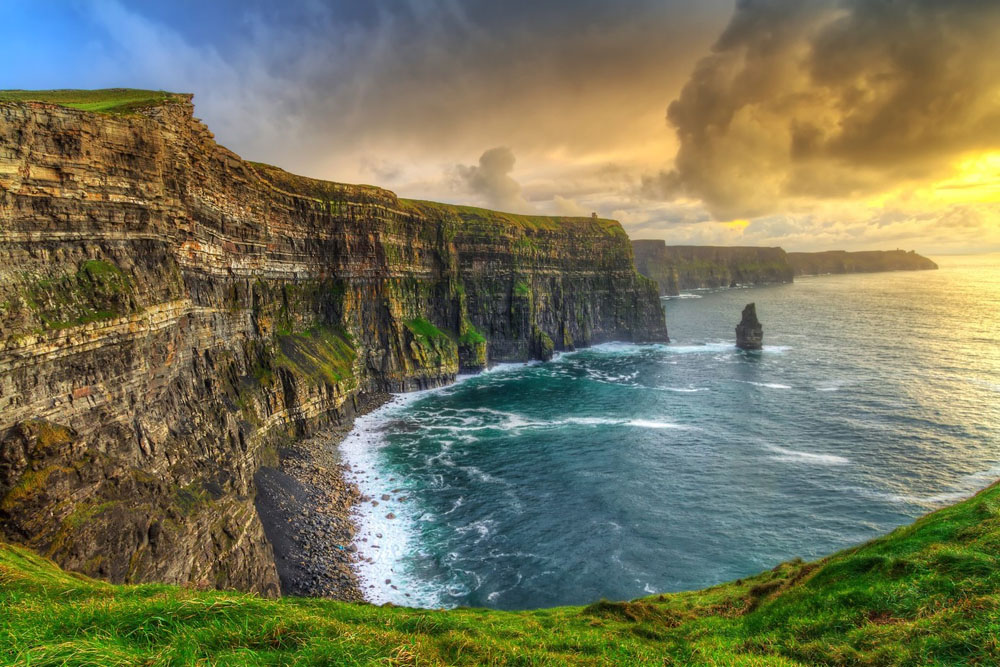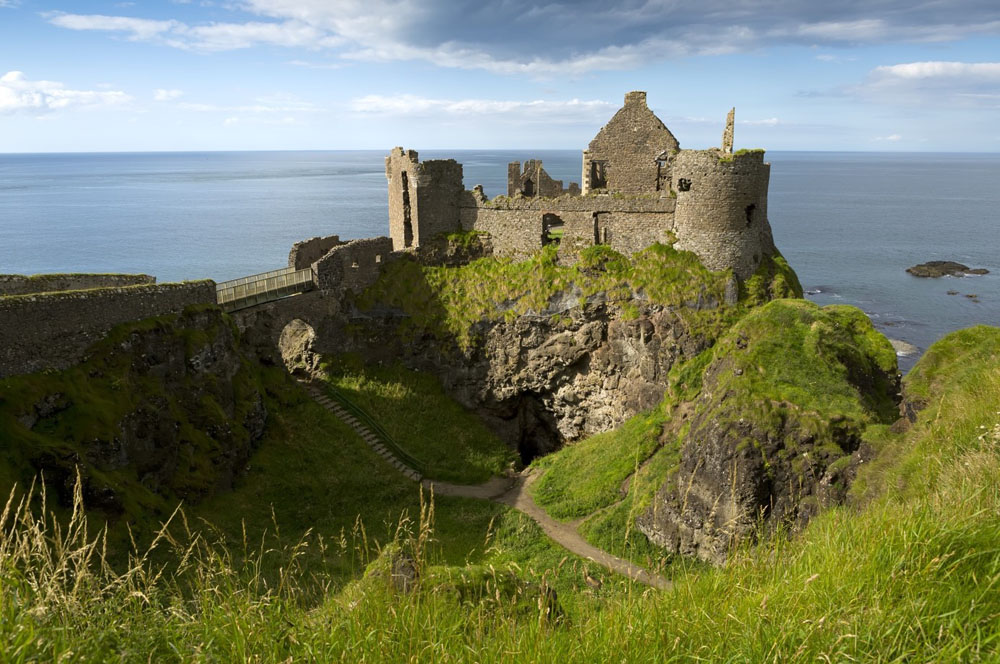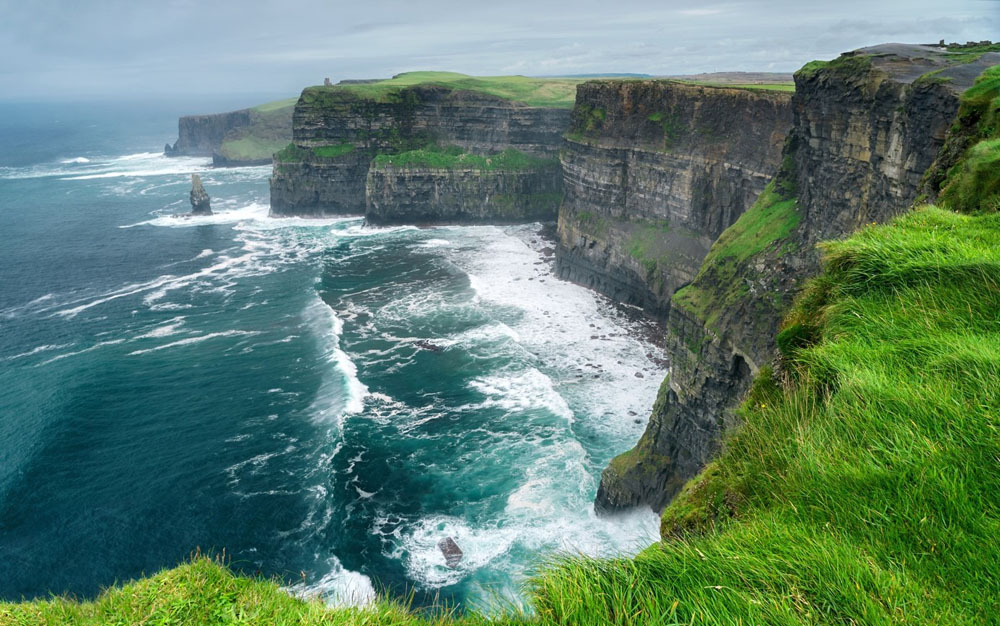
Lush green meadows as far as the eye can see, rugged cliffs lapped by roaring waves, mossy castle ruins, flocks of sheep, warm hospitality, quaint pubs and small fishing villages. This is how you imagine Ireland. And that's exactly how it is. And so much more.
In addition to idyllic seclusion and nostalgia, time has not stood still everywhere on the Emerald Isle, which is particularly evident in the major cities of Ireland and Northern Ireland, such as Belfast and Dublin. Dublin, with its medieval quarters and futuristic architecture, cleverly combines the past with the modern and Belfast can hardly be described as a sleepy nest. The island's cities are buzzing with life.
It is precisely this wealth of contrasts that attracts so many people to the island every year, including for a language study trip to Ireland. English is the official language in Ireland alongside Irish / Gaelic, which is mainly spoken by the Gaeltacht, a minority of the country in more rural areas. Ireland is therefore ideal for an English language study trip. Plan a little time and don't spend your stay exclusively in your chosen city. Explore the magnificent Irish countryside, hire a car and drive along the coast and inland or hop on a bus and let yourself be whisked away into another world over the weekend, away from the city and into nature. You certainly won't regret it!


But which city in Ireland should you choose? Dublin, the capital of the Republic and the largest city in the country? Or would you prefer Belfast in Northern Ireland, part of the United Kingdom? Or how about Galway, the most popular city for language travel in the west of Ireland? Perhaps Cork, in the south of the country, or a smaller city such as Bray, right on the coast and yet in close proximity to Dublin?
The decision for or against a destination in Ireland or Northern Ireland also depends on what you expect from your language study trip. If you are looking for peace and seclusion, proximity to the coast and nature, then small towns such as Bray or Shannon are ideal for learning English and relaxing at the same time. If, on the other hand, you expect your language study trip in Ireland to be rich in culture and leisure activities, a successful mix of city break and English lessons, then the cities of Dublin, Cork or Belfast in Northern Ireland are probably more suitable for you. Galway, on the west coast of Ireland, is particularly suitable for young language students or those who are young at heart. With two universities, the small town is bursting with youthful joie de vivre, pubs and nightclubs.
Grab a travel guide, read the testimonials of other language students and find the city or place that fascinates you the most and where you would like to spend a few weeks of your life.


No matter where you are traveling to Ireland, with the right flight you can be on the island in no time at all. It takes just over two hours to fly from Zurich to Dublin, with at least one stopover it takes a few hours longer to Cork or Shannon and also to Northern Ireland.

You will probably already be aware that Ireland is not a country with pleasant bathing weather. Even in summer, temperatures rarely exceed 20°C; 17 to 19°C is more likely. Ireland is at its sunniest in May and June, with the south-east enjoying the most hours of sunshine during this time. However, with maximum temperatures of 15°C in Dublin (minimum 6°C), May can still be a little chilly.
The Emerald Isle can only stay green if it rains enough, and it does in Ireland. Rainier than most other regions in Europe, with an average of 13 days of rain in Dublin in July, 11 days in Cork and even 19 days of rain in Belfast, you shouldn't do without good rainwear at any time of year on any part of the island. Generally speaking, May and June are considered the best time to visit, but from July onwards the hours of sunshine decrease and the rain increases, although July and August are the warmest months of the year. It is sunniest on the south coast and in the east, but the further west you go, the less sunshine and more rain there is.

The range of English courses on offer in Ireland is considerable, but somewhat less extensive in Northern Ireland. Standard courses, intensive courses and preparation courses for the Cambridge FCE, CAE and CPE certificates are offered by most language schools. Many schools also offer business English courses, IELTS preparation courses, individual lessons and combined standard courses and individual lessons. You can also find special courses, such as 30+ or 50+, at some language schools on the island. Most language travel agencies also offer the "At the teacher's home" model, where you live, learn and live with your English teacher alone or with a second person.
The same entry requirements apply to Northern Ireland and Ireland, which allows Swiss citizens resident in Switzerland to enter the country with a valid identity card or Swiss passport. A visa is not required.
Pickpocketing has been on the increase in Ireland recently, especially in Dublin, so you should not necessarily leave your luggage unattended there or anywhere else. Otherwise, language travelers in Ireland need have little concern for their safety; the Federal Department of Foreign Affairs (FDFA) also considers the situation to be stable.
The situation is different in Northern Ireland. The warning level for this part of the United Kingdom was set to the second-highest level "severe - attack is highly likely" following the terrorist attacks in June 2017, as was the case in England, Wales and Scotland, meaning that terrorist attacks are likely at any time. Secondly, the same warning level also applies to attacks by Northern Irish groups in their own country, still a consequence of the Northern Ireland conflict.
However, this does not necessarily mean that you have to avoid Northern Ireland. Northern Ireland is still not a really unsafe place for tourists, as long as you avoid conflict zones, as well as the summer parades, where there are always violent riots.

The cost of a language study trip to Ireland or Northern Ireland can vary greatly from school to school and also depends on the type of course chosen. Individual lessons are of course more expensive than group lessons, and a standard course is cheaper than an intensive course with a higher number of lessons per week. The type of accommodation also plays a role in the price. For example, accommodation with a host family with half board is usually cheaper than in a hall of residence where you also have to pay for your own meals.
For a standard language course with around 20 lessons per week, accommodation in a single room with a host family including half board, you should expect to pay around GBP 1,300 to 1,700, which is approximately between CHF 1,700 and 2,100, but can vary depending on the exchange rate. So when booking, make sure you check the currency in which the prices are quoted!
In addition to the cost of the English course and accommodation, some schools charge placement fees, course materials and other fees, while some language schools already include these. You will also have to pay for your meals during your language study trip in Ireland, and you will probably have to add one or two expenses for nightlife, leisure activities, excursions, mobility costs and more.
You should also factor the cost of the flight into your budget for your language study trip to Ireland. Direct flights from Zurich to Dublin cost around CHF 300. You can get them even cheaper if you choose them at off-peak times, i.e. very early in the morning or late in the evening, or if you plan a stopover.